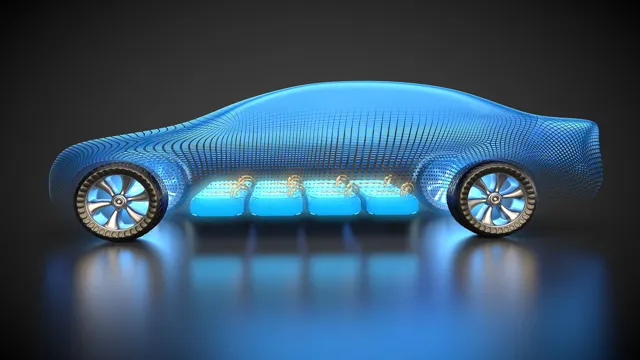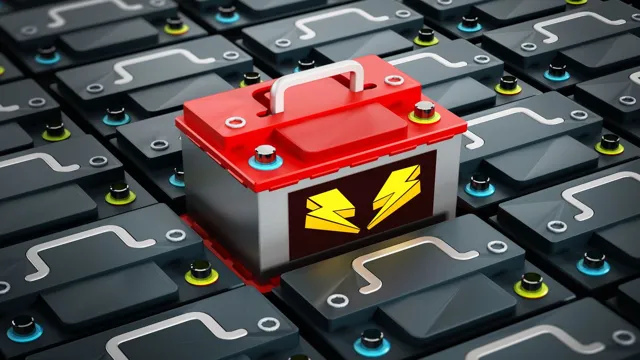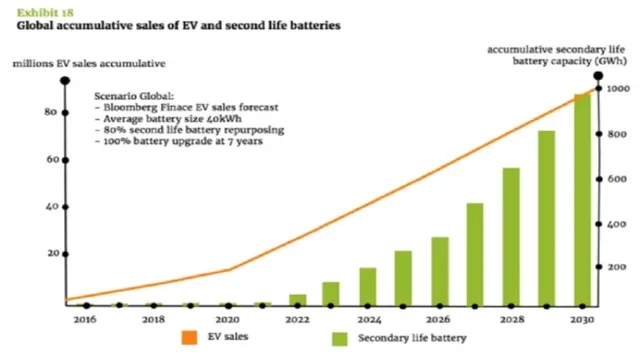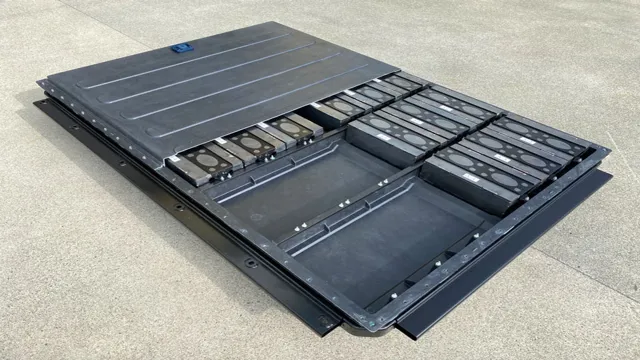Unveiling the different battery types that power electric cars: A comprehensive guide
Electric cars are becoming more and more popular as people become increasingly aware of the impact that fossil fuels have on the environment. However, many people still have questions about how these cars work and what goes into making them run. One important component of electric cars is the battery.
In fact, the battery is essentially the heart of every electric vehicle, providing the power that allows it to move. But what kind of batteries are used in electric cars? In this article, we’ll take a closer look at the different types of batteries used in electric cars and how they work.
Lithium-Ion Batteries
When it comes to battery types used in electric cars, lithium-ion batteries are the most common. They offer a high energy density and a long lifespan, making them ideal for powering electric vehicles. Lithium-ion batteries work by using a chemical reaction to create a flow of electrons, which produces electrical energy.
These batteries are lightweight and compact, which is essential for electric cars as they need to be able to fit into a limited space while providing enough power to drive the vehicle for a reasonable distance. While lithium-ion batteries have their advantages, there are concerns regarding their safety and the environmental impact of their production and disposal. Despite these concerns, it is clear that the use of lithium-ion batteries in electric cars is currently the most viable option for powering the transportation industry, and technological advancements are being made to minimize their negative impact.
Most Commonly Used in EVs
Lithium-Ion Batteries When it comes to electric vehicles (EVs), the most commonly used type of battery is the Lithium-Ion battery. These batteries are highly efficient and pack a lot of energy into a small space, making them ideal for powering vehicles. They work by using a chemical reaction between lithium ions and a conducting solution to create a flow of electrons, generating energy that can be used to power the vehicle.
Lithium-Ion batteries are also known for their ability to hold their charge for longer periods of time compared to other types of batteries, allowing EVs to travel longer distances before needing to recharge. This makes them a popular choice for EV manufacturers who want to offer their customers a reliable and efficient vehicle with a longer range. Overall, Lithium-Ion batteries are an essential component of modern electric vehicles, helping to make them more sustainable and environmentally friendly.

High Energy Density and Efficiency
Lithium-ion batteries are known for their high energy density and efficiency, making them popular in everything from our smartphones and laptops to electric cars and power grids. Unlike traditional batteries, which rely on reactive chemicals to produce electricity, lithium-ion batteries use lithium ions to create a flow of electricity, allowing them to pack more power into a smaller size. This makes them incredibly versatile and efficient, with the ability to store and discharge energy quickly and reliably.
Plus, they have a long lifespan and are relatively low maintenance, making them a cost-effective and sustainable choice for powering our modern world. So, whether you’re looking to power your mobile devices or your home energy system, lithium-ion batteries are an excellent choice for high-energy density and efficiency.
Solid State Batteries
When we talk about battery types used in electric cars, one of the most promising kinds is the solid-state battery. These batteries work by using solid electrolytes instead of liquid ones, which make them much safer and more stable. Moreover, they have a higher energy density, meaning they can store more energy and offer longer ranges for electric vehicles.
Compared to traditional lithium-ion batteries, solid-state batteries also last longer, can charge faster, and are better suited to extreme temperatures. However, despite their many advantages, solid-state batteries also face some challenges, such as manufacturing costs and scalability issues. Overall, it is clear that solid-state batteries hold great potential for revolutionizing the electric vehicle industry and ushering in a new era of sustainable transportation.
Emerging Technology for EVs
Solid State Batteries Solid-state batteries are emerging as potentially game-changing technology for the advancement of EVs. Unlike traditional lithium-ion batteries, solid-state batteries have a solid electrolyte instead of a liquid one. This makes them safer, with a lower risk of flammability or explosion.
Additionally, they offer higher energy density, which means they can store more energy in a smaller space, giving EVs longer ranges without needing to recharge as frequently. Solid-state batteries are also made of more sustainable materials, like ceramics, and are less prone to degradation over time, making them a long-lasting and environmentally friendly solution. While there are still challenges to overcome before solid-state batteries can be widely adopted, their potential to revolutionize the EV industry cannot be underestimated.
Higher Energy Density and Safety Benefits
Solid state batteries have become an exciting new development in battery technology. This type of battery offers higher energy density and safety benefits compared to traditional batteries. The solid state design uses a solid electrolyte instead of a liquid, which eliminates the need for flammable and potentially hazardous materials.
Additionally, the solid state electrolyte allows for a higher energy density, which results in a longer-lasting and more efficient battery. Imagine your cell phone lasting for weeks instead of days, or your electric car being able to travel farther on a single charge. These benefits make solid state batteries an attractive option for a variety of industries, including automotive, electronics, and aerospace.
While still in the early stages of development and commercialization, solid state batteries have the potential to revolutionize the battery industry and transform the way we use and rely on energy.
Nickel-Metal Hydride Batteries
When it comes to battery types used in electric cars, nickel-metal hydride (NiMH) batteries are a popular option. These batteries have a good energy density, allowing them to store more energy in a smaller space. They also have a long lifespan and are less prone to overcharging compared to other battery types.
However, NiMH batteries are not as efficient as lithium-ion batteries and have a lower thermal stability, which means they can overheat and degrade quicker if not properly maintained. Still, they remain a viable option for hybrid vehicles due to their ability to handle frequent discharge and recharge cycles. Overall, the choice of battery depends on the specific needs and application of the electric car, with factors such as cost, performance, and environmental impact all playing a role in the decision-making process.
Common in Hybrid Vehicles
Nickel-Metal Hydride (NiMH) batteries are commonly used in hybrid vehicles as they offer several benefits. One advantage of NiMH batteries is their high energy density, meaning they can store a large amount of energy in a small space. This allows hybrid vehicles to operate efficiently with a smaller battery pack compared to other types of batteries.
Another advantage of NiMH batteries is their relatively low cost compared to other battery types, such as lithium-ion. NiMH batteries also have a long lifespan, making them a reliable choice for hybrid vehicles. However, they do have their limitations.
NiMH batteries are more prone to self-discharge, meaning they can lose charge over time even when not in use. Additionally, NiMH batteries have a lower power density than lithium-ion batteries, which can affect the acceleration and top speed of hybrid vehicles. Overall, NiMH batteries are a popular choice for hybrid vehicles due to their cost-effectiveness and reliability, but advances in battery technology may lead to their eventual replacement.
Less Efficient and Heavier Than Lithium-Ion
Nickel-Metal Hydride batteries, also known as NiMH batteries, have been used for quite some time now, but they are far less efficient and heavier than their counterpart, lithium-ion batteries. While they are still used in some applications, such as hybrid cars and portable power tools, the trend is towards the more advanced and efficient lithium-ion batteries. The reason for this is that NiMH batteries have lower energy density, meaning they can store less energy than similarly sized lithium-ion batteries.
This makes them bulkier and heavier, which is a disadvantage in applications where weight and size are critical factors. However, they are still considered to be a viable alternative for some applications, and until better and more cost-effective technologies become widely available, they will continue to have their place in certain niche markets.
Lead-Acid Batteries
When it comes to the battery types used in electric cars, lead-acid batteries have been around for a long time. They are not as popular as they used to be, but they are still in use today, especially in hybrid vehicles. Lead-acid batteries are heavy, and they do not have a long lifespan compared to newer battery types like lithium-ion.
However, they are still used because they are cheaper and easier to manufacture. They are also more environmentally friendly as they can be recycled. Overall, while lead-acid batteries have their drawbacks, they are a practical choice for certain types of electric cars.
Oldest and Cheapest Battery Technology
When it comes to battery technology, most people are familiar with the lithium-ion batteries used in our smartphones and laptops. But did you know that the oldest and cheapest battery technology still widely in use today is the lead-acid battery? Despite their age, lead-acid batteries are still widely used in cars, boats, and other applications where a reliable and inexpensive power source is needed. These batteries operate by using a chemical reaction between lead plates and sulfuric acid, which generates electricity.
While they may not offer the same energy density or lifespan as lithium-ion batteries, lead-acid batteries are still an important part of our modern world, and their longevity and affordability make them a practical solution for many applications. So, the next time you turn the key in your car or start up your boat, remember that the trusty lead-acid battery under the hood is still an important part of our technological landscape.
Low Energy Density and Shorter Lifespan
Lead-acid batteries are known for their low energy density and shorter lifespan compared to other types of batteries. This is because lead-acid batteries use a heavier, less efficient electrochemical system that results in a lower energy-to-weight ratio. Additionally, lead-acid batteries tend to have a shorter lifespan due to their susceptibility to sulfation, corrosion, and other forms of degradation over time.
Despite these drawbacks, lead-acid batteries remain popular in certain applications, particularly in automotive and uninterruptible power supply (UPS) systems, due to their low cost and reliability. However, as technology continues to advance and more efficient alternatives become available, it is likely that lead-acid batteries will be phased out in favor of more eco-friendly and sustainable options.
Conclusion
In the dynamic world of electric cars, the battery types used are crucial to their success. From the reliable lead-acid battery to the stunningly innovative solid-state battery, each has its own unique advantages and challenges. Ultimately, the perfect battery type for electric cars will be one that is affordable, long-lasting, and easy to maintain.
Until then, we’ll have to keep plugging away at finding the perfect solution. But rest assured, with advancements in technology and a drive towards sustainability, the future of battery types in electric cars is bright and full of potential.”
FAQs
What are the different battery types commonly used in electric cars?
The most commonly used battery types in electric cars are lithium-ion, lead-acid, and nickel-metal hydride batteries.
Which battery type offers the longest driving range for electric cars?
Currently, lithium-ion batteries offer the longest driving range for electric cars, with some models offering up to 400 miles on a single charge.
Are different battery types interchangeable in electric cars?
Generally, different battery types are not interchangeable in electric cars as they have varying specifications and charging requirements.
What factors should be considered when choosing a battery type for an electric car?
When choosing a battery type for an electric car, factors such as driving range, battery lifespan, charging time, and cost should be considered. Additionally, the specific requirements and limitations of the car’s electric system should also be taken into account.





